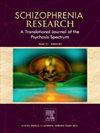改善慢性精神分裂症患者认知障碍的新型数字干预:随机临床试验
IF 3.6
2区 医学
Q1 PSYCHIATRY
引用次数: 0
摘要
背景独立数字疗法治疗精神分裂症认知障碍的需求尚未得到满足。本研究旨在评估新型数字疗法 IBT-SC02 对稳定型精神分裂症患者认知障碍的疗效和可接受性。年龄在18-50岁之间的精神分裂症患者被随机分为IBT-SC02干预组和等待对照组。主要结果是认知表现,采用MATRICS共识认知电池(MCCB)综合评分进行测量。辍学率为 5%。与对照组相比,干预组患者的 MCCB 综合得分有了明显提高,但在排除了未蒙面评分者收集的数据后,提高幅度有所减小。事后分析显示,干预组的参与者在 MCCB 七个领域中的四个领域(处理速度、语言学习、视觉学习、推理和问题解决)都有所改善。结论这些结果表明,IBT-SC02 是一种全自动数字治疗方法,它可以改善稳定期精神分裂症患者的认知能力,并有可能成为无法获得训练有素的专业人员治疗的患者的一种治疗选择。本文章由计算机程序翻译,如有差异,请以英文原文为准。
A novel digital intervention for improving cognitive impairment in patients with chronic schizophrenia: A randomized clinical trial
Background
There is an unmet need for stand-alone digital therapeutics for cognitive impairment in schizophrenia. This study aimed to evaluate the efficacy and acceptability of a novel digital therapeutic, IBT-SC02, for cognitive impairment in stable schizophrenia patients.
Methods
A randomized, parallel-group trial was conducted at the Sichuan Province Institute of Mental Health, China. Participants aged 18–50 diagnosed with schizophrenia were randomized to either the IBT-SC02 intervention or a wait-list control. The primary outcome was cognitive performance measured using the MATRICS Consensus Cognitive Battery (MCCB) composite score.
Results
A total of 80 patients were randomized (40 intervention, 40 control). The dropout rate was 5 %. The intervention group exhibited significant improvements in the MCCB composite score compared to the control, though the improvement lessened after excluding data collected by unmasked raters. Post-hoc analyses revealed that participants in the intervention group improved in four out of the seven MCCB domains (speed of processing, verbal learning, visual learning and reasoning and problem solving). No adverse events were reported.
Conclusions
These results suggest that IBT-SC02, a fully automated digital therapeutic, improved cognitive performance in patients with stable schizophrenia and can potentially be a treatment option for patients without access to trained professionals.
求助全文
通过发布文献求助,成功后即可免费获取论文全文。
去求助
来源期刊

Schizophrenia Research
医学-精神病学
CiteScore
7.50
自引率
8.90%
发文量
429
审稿时长
10.2 weeks
期刊介绍:
As official journal of the Schizophrenia International Research Society (SIRS) Schizophrenia Research is THE journal of choice for international researchers and clinicians to share their work with the global schizophrenia research community. More than 6000 institutes have online or print (or both) access to this journal - the largest specialist journal in the field, with the largest readership!
Schizophrenia Research''s time to first decision is as fast as 6 weeks and its publishing speed is as fast as 4 weeks until online publication (corrected proof/Article in Press) after acceptance and 14 weeks from acceptance until publication in a printed issue.
The journal publishes novel papers that really contribute to understanding the biology and treatment of schizophrenic disorders; Schizophrenia Research brings together biological, clinical and psychological research in order to stimulate the synthesis of findings from all disciplines involved in improving patient outcomes in schizophrenia.
 求助内容:
求助内容: 应助结果提醒方式:
应助结果提醒方式:


